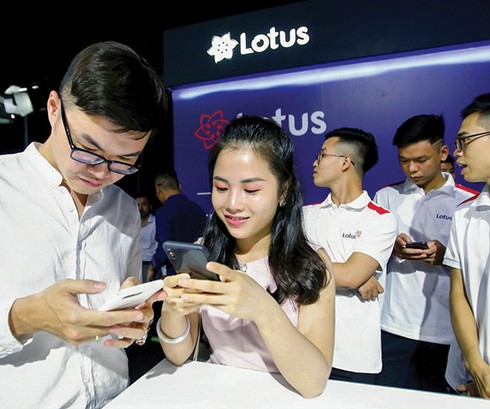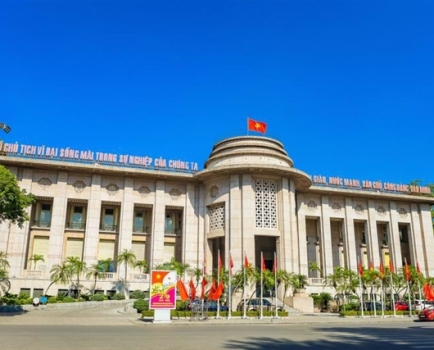Local social networks hoping to gain popularity
Tue, 22 Oct 2019 15:17:00 | Print | Email Share:
The race among Vietnamese social networks is starting to become exciting but much needs to be done for them to develop.

Photo: Viet Tuan
It was at 8am on September 21 at the National Convention Center in Hanoi and hundreds of people were queuing up to check-in for the launch ceremony of Astra, a Vietnamese tourism social network.
Astra also signed investment cooperation deals with 22 venture investors at the ceremony, with capital of over $10,000 for each deal. Most notable was the $1 million investment from Mr. Pham Thanh Hung, Chairman of CenGroup. Astra expects to capture 5 per cent of the global online travel market in the next five years.
Choosing a niche market like travel, Astra is the first social network to use the paying rewards model for users when they post content on its platform.
Mr. Nguyen Tiep, CEO of Astra, said paying rewards to users through reputable reviews of destinations and travel services is a way to attract users to join the social network and encourage them to share their experiences and reviews with others.
Mr. Hung said review models on tourism and services are increasingly popular around the world, such as TripAdvisor and Michelin, while Vietnam has many advantages in tourism that have not been adequately utilized.
“Therefore, there should be tech applications and social networks such as Astra for tourism’s potential to be exploited,” he added.
Great ambition
Vietnamese social network Lotus is operated by VCCorp, a local internet and digital content company, and recently surprised with a spectacular launch ceremony on September 16 in Hanoi.
Lotus is a product of more than 200 Vietnamese developers working in various fields such as mobile apps, artificial intelligence (AI), big data, and cloud computing, with VND1.2 trillion ($51.7 million) in investment capital raised by VCCorp.
Mr. Nguyen The Tan, General Director of VCCorp, introduced the difference of Lotus through 3D simulation images. When joining the app, users need not add friends and need only be interested in / follow / become fans and connect to content and topics they like. Lotus users will be able to accumulate “tokens” (a virtual currency) by creating content and expressing their support for other people’s content through tokens instead of likes or emoticons, as on Facebook.
After the launch ceremony, Lotus will run in beta mode for three to six months, during which time VCCorp’s technical engineers will add more necessary features or content based on feedback from the public.
Minister of Information and Communications Nguyen Manh Hung expressed his expectation that Lotus would succeed in inspiring other Vietnamese tech companies to make a commitment to “Make In Vietnam”, creating Vietnamese tech products and going global.
“The success of Lotus will contribute to bringing the number of users of Vietnamese social networks to the equal of those using foreign social networks by next year,” he added.
Gapo, a Vietnamese social network created by the Gapo Technology Company, was officially launched in July. Each user account has different options for decorating their “house”.
The personal account interface can be customized with unlimited wallpapers and colors to express their aesthetic and identity. In the next stage of the project, users will be able to access more videos, music, or other interactive images. It also allows users to identify accounts to protect and secure their interests in case of a dispute.
Gapo has already received an investment commitment of VND500 billion ($21.4 million) from G-Capital, which will be used in the first phase of the project. Two days after the launch ceremony, Gapo’s users stood at 200,000 and it expects to reach 50 million users by the end of 2021.
Mr. Ha Trung Kien, Co-founder and CEO of Gapo, told VET that it will not directly compete with Facebook or any other social network and merely provides an alternative for users. A common feature of Gapo and social networks like Facebook, Twitter, and Instagram is connecting friends through posting, commenting, and sharing and providing an emotional quality, but Gapo differentiates itself by personalizing the user experience.
Meanwhile, Hahalolo, the first social network on tourism, was officially launched in early June by the local Hahalolo Travel Social Network JSC, based on a platform of integrating social networks, online tourism services, and e-commerce. Hahalolo allows users to share posts, comments, photos, and videos of their travels as well as to communicate and interact with each other everywhere.
The difference with Hahalolo is its new functions of Experience, Tours, Hotels, and Shopping, which allow users to book flight tickets and accommodation and go shopping online. Integrated with online travel agents and e-commerce providers, it will be a bridge connecting travel lovers and between suppliers of tourism services and tourism retailers, opening up a large online space to learn, connect, and share interesting and useful information on tourism.
Hahalolo currently provides information on tens of thousands of hotels, apartments, and villas in Vietnam, ten Southeast Asian countries, Japan, the Republic of Korea, and some ten European countries with popular destinations, as well as shopping, dining, and entertainment venues. It has 500,000 user accounts at the moment and targets reaching 2 billion by 2024 and to be listed on the US stock exchange by 2024 or 2025.
Newcomers, new opportunities
With the launch of Lotus, Mr. Hung spoke about the 15-year cycle of the internet and took the example of Lotus as a product in the third wave of the internet - a new path for other social networks.
The first wave was building the infrastructure and foundations of an online world, with famous names like Cisco and Microsoft being the main players, he explained, while the second wave was mobile phones, social media, and platform economics, with Facebook, Google and Apple.
“These two cycles are known and most of those involved are global companies, but the third wave is when the internet will be integrated into every part of human life and new names will appear,” he said.
In Vietnam, figures from the Ministry of Information and Communications (MoIC) show that in addition to the popularity of Facebook and YouTube, 455 domestic social networks have been licensed, of which 48 were licensed in the first six months of this year.
“The third wave will be an opportunity for local companies, using global technology to solve local problems,” Mr. Hung said.
MoIC proposed goals for developing Vietnam’s digital ecosystem in August 2018. It noted that developing the digital ecosystem has an important role to play in promoting sustainable socioeconomic development and contributing to ensuring national defense and security.
The task set out was to develop five groups of products and services: information searching, social networks, web browsers, operating systems, and malware prevention software.
According to the ministry, it is necessary to research and develop Vietnamese digital ecosystems and domestic enterprises play a key role in implementation. However, the thinking should be different, aiming to apply technology to resolve problems and meet people’s practical needs in Vietnam, bringing common benefits for society.
Prime Minister Nguyen Xuan Phuc agreed with the ministry on Vietnam’s digital ecosystem development, focusing on social network development and search engines. These emphases have motivated Vietnamese businesses to invest billions of dong in developing Vietnamese social network projects in 2019.
Questions have naturally arisen, however, about their long-term existence. Two days after Gapo’s launch ceremony, many users said they had problems accessing the web version and the mobile app. Other users received a notification that Gapo was experiencing service disruptions due to overload, and it then suspended the system to address the problem.
Hahalolo has been rated by users as a relatively simple platform compared to other social networks. Previously, many Vietnamese social networks had attracted a large number of users initially but then failed. Zing me, a product of the VNG Company, was the first social network to declare direct competition with Facebook.
There were times when the social network surpassed Facebook in terms of user numbers when Facebook was new in Vietnam, from 2009 to 2011. Since 2012, however, Facebook has expanded quickly, far ahead of Zing me.
According to MoIC, digital advertising revenue in Vietnam reached about $550 million in 2018, of which two foreign social networks accounted for 67 per cent: Facebook ($235 million) and YouTube ($133 million).
Meanwhile, the thousands of businesses producing digital content, TV, and electronic newspapers accounted for just over 30 per cent of the remaining revenue.
In fact, Google and Facebook do not pay taxes and do not need a license or even a representative office in Vietnam, while Vietnamese digital content providers must be licensed and are not permitted to create anything outside of the scope of their license.
“Domestic digital content providers still have the opportunity to regain the market and information sovereignty from foreign social networking platforms,” Mr. Tan said. “Foreign platforms are strong and have a near-monopoly, but their feature is distribution, not content production. Vietnamese businesses therefore have a chance to regain information sovereignty and if businesses have strong content, they can take advantage.”
By: VN Economic Times/VOV
---------------------------------------------
Same category News :













